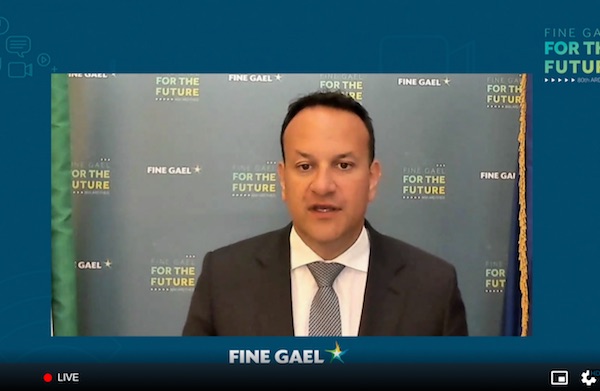
There has been a cautious welcome among nationalists and republicans to a speech by Fine Gael leader and Tánaiste Leo Varadkar in which he said Irish unification should be part of his party’s mission.
Calling for Fine Gael to organise in the Six Counties, he said that the party needs to develop its “own vision of what unification should look like” separately to Sinn Féin.
Delivering the opening speech at his party’s annual conference, which was held online, Varadkar focused largely on the north of Ireland and the aftermath of Brexit.
“I believe in the unification of our island and I believe it can happen in my lifetime,” the Tánaiste said.
“It means the unification of the people of our island as well as territory of Ireland and it is a legitimate political aspiration. It is in our Constitution and is provided for in the Good Friday Agreement should a majority of people in the North and South vote for it.”
He said the views of unionists must be respected but that “no one group can have a veto on Ireland’s future”.
The comments appear to mark a shift away from Fine Gael’s traditionally pro-British and pro-unionist stance.
However, he criticised Sinn Fein, and said Fine Gael’s approach to reunification would be “inclusive” as opposed to what he called Sinn Fein’s “crude vision” and “cold form of republicanism”.
Varadkar’s speech comes on the centenary of the partition of Ireland, which was accepted and implemented by those who gave rise to his party 100 years ago.
The anniversary has been an uncomfortable one for Fine Gael, with worse to come as the centenaries of the event of Ireland’s civil war, a result of partition, are set to be marked.
In his speech Varadkar said reunification must not be the “annexation” of the north of Ireland.
“It means something more, a new state designed together, a new constitution and one that reflects the diversity of a bi-national or multi-national state in which almost a million people are British. Like the new South Africa, a rainbow nation, not just orange and green.”
He said Ireland would need to consider a range of factors that may need to change, such as new titles, shared symbols, or a new senate.
“We also need to map out how we can take the best of both jurisdictions and apply them across Ireland as a whole – perhaps our welfare and pensions system, their NHS.
“And also consider what might remain different, because unification is not assimilation, things can be different, north and south, perhaps maintaining two education systems, or two legal systems, if deemed appropriate.”
“Until these questions are answered, until we have a clear proposition to put to the people on both parts of our island, then a border poll [a Six County vote on reunification] is premature.”
Unionists described the speech as badly-timed, as the anti-Catholic marching season is reaching its climax.
Ulster Unionist Party leader Doug Beattie added that Irish unity could be in the Fine Gael leader’s lifetime or “it could be 50 years away. He continued: “Personally, I need to get on with making sure that Northern Ireland works, that’s what I’m focusing on.
Britain’s Direct Ruler in Ireland, Brandon Lewis, described the remarks as “unhelpful and ill-advised”.
The British government minister linked the timing of Varadkar’s comments to the the Dublin Bay South by-election and Sinn Féin gains in the latest Irish Times/Ipsos MRBI opinion poll.
He said the British government “would be concerned about any deviation from the principle of consent as enshrined in the Belfast Good Friday Agreement” and urged everyone to “dial down the rhetoric, particularly at this time of year”.
Fine Gael’s Simon Harris rejected the criticism. He said Irish ministers did not “need permission” to talk about the issue of Irish unity
Commenting on the matter, the Minister for Further and Higher Education said: “It has been a hell of a long time since any Irish ministers needed permission from the British government to make a comment at a political ardfheis.”
He told RTÉ’s Morning Ireland: “I don’t comment on Boris Johnson’s constant rhetoric about preserving the union, and his sincerely held view in relation to that”.
Mr Harris said it is “a legitimate aspiration of Irish people to unify our country” and claimed that his party leader Mr Varadkar “believed passionately in a united Ireland”.
The change in Fine Gael tone was broadly welcomed by northern nationalists.
Sinn Féin leader Mary Lou McDonald said Mr Varadkar was “absolutely right” in his remarks.
“We will see [a united Ireland] well within Leo’s lifetime — of that there is no doubt,” she said.
“Can I also endorse his commentary that this issue, this project, is not in the possession of any one political party. I could not agree more.”
Ms McDonald said it was important “that all of us, right across Irish society, including unionist citizens or sceptical citizens that have yet to be won over to the huge opportunities that Irish reunification represents, that all of us have a position and plan.”
“There will be contrasting views and visions of a new Ireland. The Tánaiste made some disparaging remarks around what he called Sinn Féin’s crude vision of reunification. Our vision is far from crude.”
![[Irish Republican News]](https://republican-news.org/graphics/title_gifs/rn.gif)
![[Irish Republican News]](https://republican-news.org/graphics/title_gifs/harp.gif)

